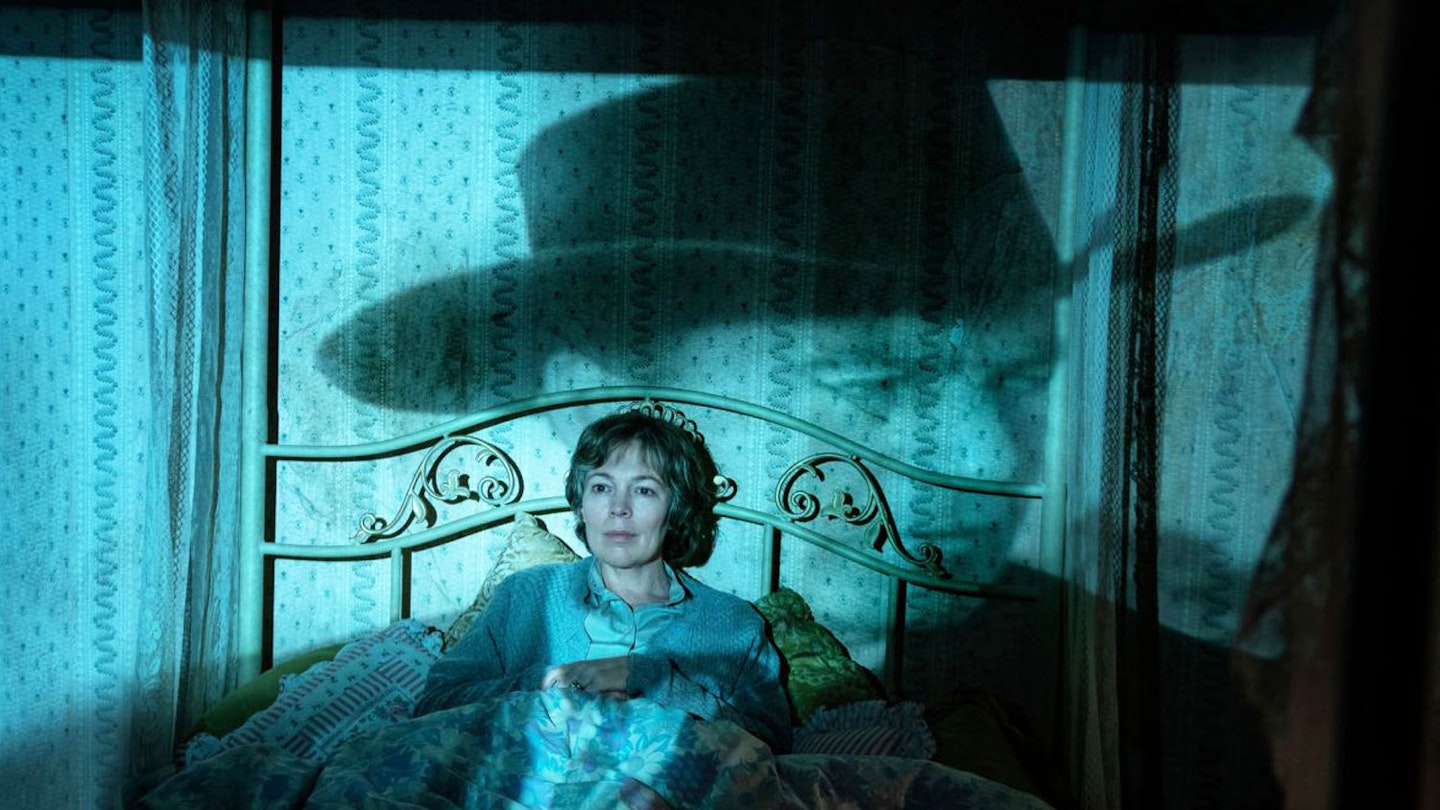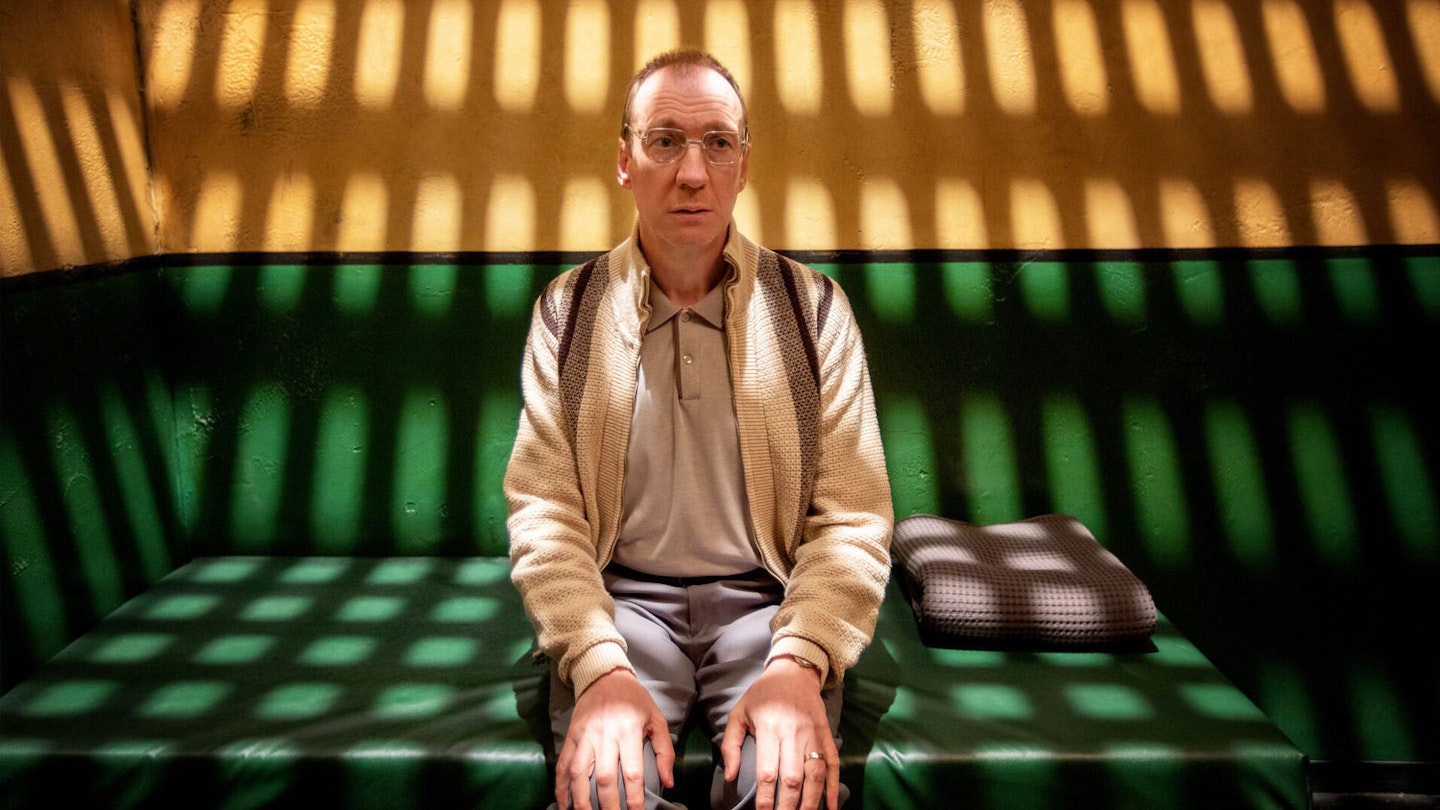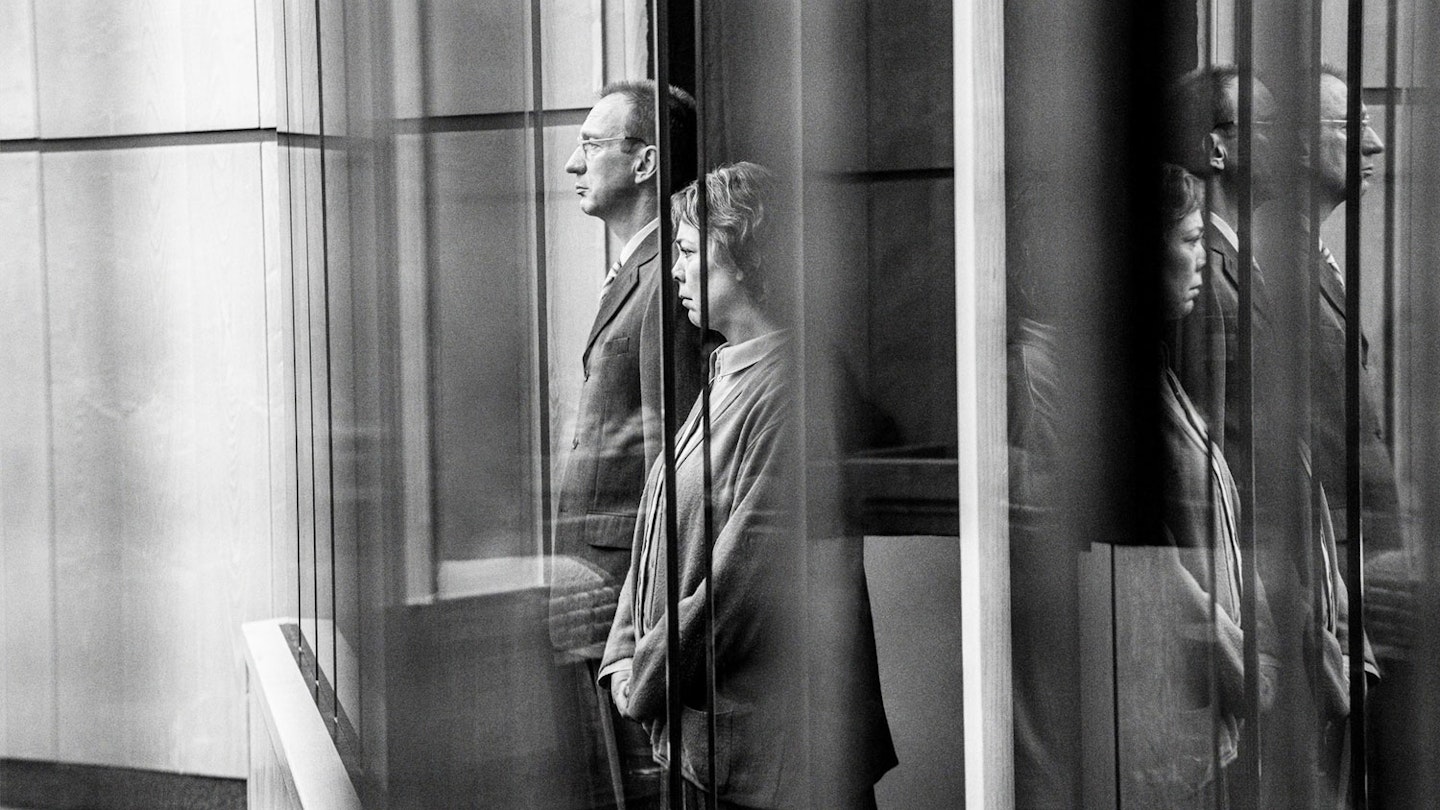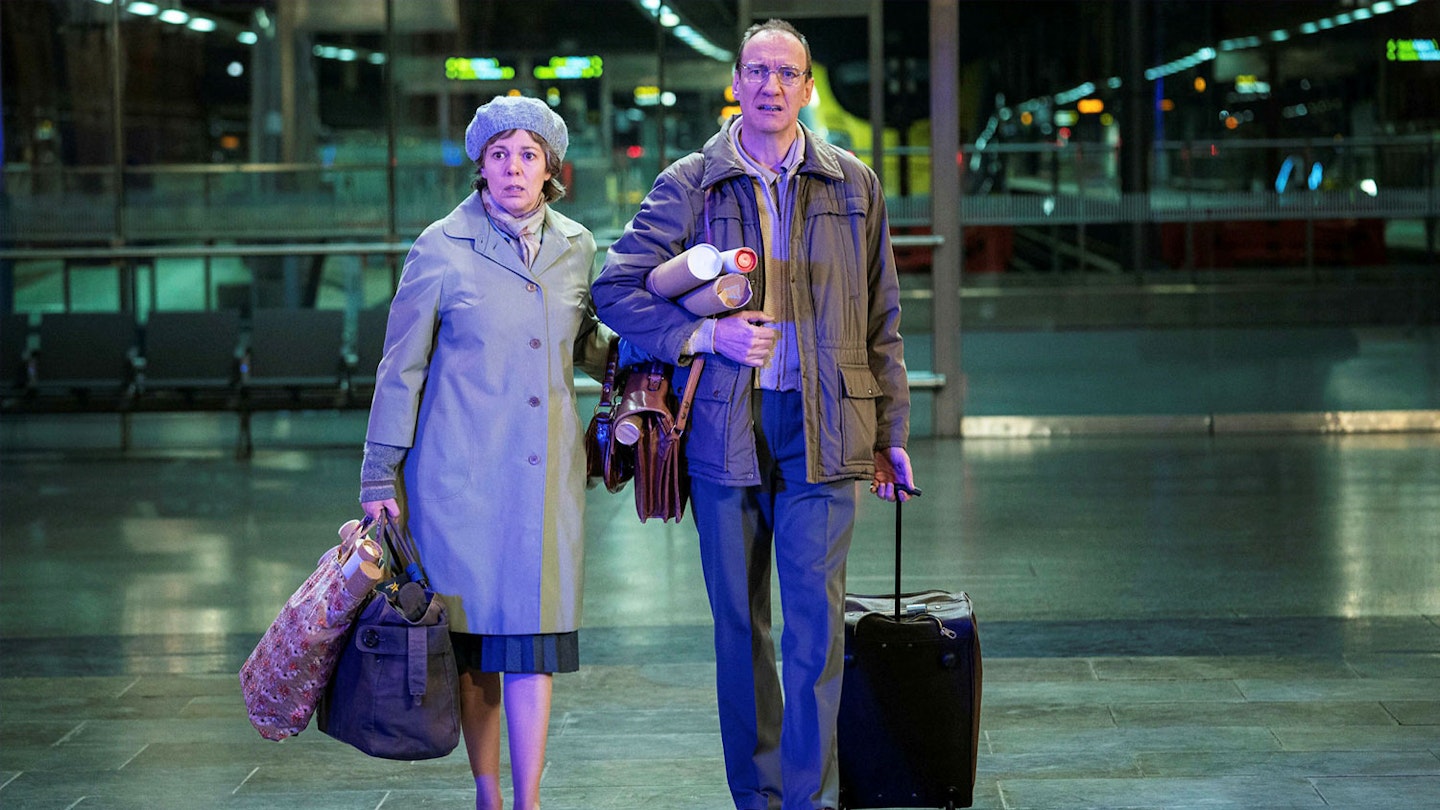When it comes to British talent on TV, it doesn’t get much better than a new limited series starring national treasures Olivia Colman and David Thewlis, with direction from Will Sharpe, the creative mind behind Channel 4’s Flowers and upcoming Benedict Cumberbatch movie The Electrical Life Of Louis Wain.
Landscapers – written by Colman’s husband Ed Sinclair and streaming on Sky Atlantic and NOW – combines black comedy, dramatic heft and surrealist sequences to tell the fascinating true story of Susan and Christopher Edwards, a librarian and accountant from Dagenham who were convicted in 2014 of murdering Susan’s parents and keeping it a secret for 15 years. We spoke to Colman and Thewlis about Sinclair’s script, separating truth from fiction, and the experience of filming this uniquely fantastical show:
Hear our review of Landscapers on the latest episode of the Pilot TV Podcast.
PILOT TV: Landscapers. What an extraordinary series this is. The first thing that struck me is that it almost feels like it's as much about the genre of true crime drama, as it is actually about a true crime story itself. Does it feel that way to you?
OLIVIA COLMAN: Yes. I mean, it's full of originality. I haven't seen it done this way before.
DAVID THEWLIS: It's obviously a show that very much explores the notion of storytelling itself with the gradual taking apart, the deconstructing – literally – of the set, which actually happens in the credit sequence of the first episode. From the very opening frame we see that we're playing with these tricks – consciously showing the beginning of filming, hearing action and the turning on of a rain machine. What justifies all those in this particular show is that it blends in very neatly with one of the themes, one of the details of the crime, Susan's [Olivia’s character] obsession with old Hollywood, and therefore storytelling itself.

OC: They really went over and over and over again, over 15 years, a story they made up, which, in the face of evidence and being able to pinpoint the bullet wounds, didn't hold up. So there's that sort of unravelling and unpeeling, which is mirrored in the set and everything. I think it's frightfully clever!
DT: An extraordinary thing, that was something we asked about when we were making it because it's very strange, is that when they arrive at King’s Cross, Chris [Thewlis’ character] has this speech about whatever happens, just tell them the truth. This is just between the two of them – tell the truth, and we'll be fine. Don't make anything up. Just tell them the truth. Now, what he's actually saying is, ‘tell them the story that we have made up’, is what we come to understand, because there's no way any viewer would think that their story is the real story. The evidence is too compelling. And we're told from the very beginning that they were found guilty and convicted. So that's a strange one. I think that was one of my biggest questions to Will [Sharpe, director] when we were making it – what is he saying here? Because they know it's not the truth, but is he that delusional that they've come to think that it is the truth? Is he doing it just for Susan? Or is it just part of their game that they're psychologically convincing each other that it’s the truth, so therefore, they won't break it?
OC: I won't get this quite right, but there was some neurologist who was talking about how the more times you tell a story incorrectly, it becomes the real story. So you convince yourself.
That makes total sense when you're watching it, because your reality and fantasy is constantly shifting and our sympathies are constantly shifting. When Ed Sinclair [writer] created the whole thing, what was his primary interest? Was it this specific case? Or was it the idea of creating a show in which you're feeling uncertain as to what’s truth and what’s fiction?
OC: I think one of the things that was compelling to him was how it's been sort of skated over, the fact that she suffered abuse at the hands of her father as a child. That wasn't really mentioned by anybody, and it's really deeply important, you know, to carry that your whole life. It's not that she suffered when she was a child, but she's fine now and she killed them. That's not how it works, and we all know that, but I think he just felt enormous sympathy for this woman who'd suffered, and that was never taken into account when they got to court. I think he wanted to explore that maybe they are just gentle, lovely people, and there were extenuating circumstances, and we'll never know what happened that night. People can only be pushed so far, and he was interested in exploring it in a different way, I think.

The incredible visuals of it, and how we get to see the police watching these scenes play out from the past of your characters – it becomes extremely fantastical. Was that all in the script originally? Or did Will Sharpe, the director, bring some of that?
DT: No, that was absolutely in the script. In fact, those sections of the script were referred to as the 'mith'. To my understanding, that didn't have any particular meaning, it was just that when we read that in the headings to the scenes, we knew that we were back in 1998 at the time of the killing, and we're partly in the police investigation, or we're in some kind of dream sequence or flashbacks. Pretty much everything was there in the script. That's what made it such an attractive proposition right from the very start when I read it, because it was clear that this was something unique, something very different. It's playing with timelines – we're going to flash back, we're going to flash forward – and there are many things that do that these days, but this was doing it in such a new and original way. It became increasingly surprising as it went on, and I think the effect that will have on the audience is that they'll never be able to anticipate what's coming next from shot to shot, from scene to scene, episode to episode.
OC: And certainly, Will's visual genius made it possible. What Ed's written, not every director would know how to do it, and how to wield it.
DT: I think it's the combination of the two of them, these two wonderfully imaginative men and the creative flights that they both encouraged with each other. And then we were lucky enough to be cast in it.

When you're making the show, are you aware of just how elaborate it's gonna be? When you watch the finished version, is it kind of weird to see how it's all come together?
OC: You're aware all the way through that it's jumping to quite theatrical things, extreme things. And you could see that the art department had such fun. It was like, okay, could you please make a forest inside the bedroom? Could we have an open-sided pub in the darkness? ...Okay! And everybody rose to the occasion. It was such a happy job.
DT: I think it made everyone very inventive and very creative. And not just for the actors. was this a pleasure, you know, it surely was for everybody else – for the camera department, the hair and makeup department were having a ball, the costume department were really having a ball. Because it's not the kind of thing anyone usually gets to do. So we were all realizing that it was a bit of a, not necessarily once in a lifetime, but certainly something that doesn't come along very often, where one can be this playful, and have a totally new way of looking at things.
This is Ed's first script. Were you surprised by how confident and ambitious and bold it was?
OC: Well, no, I knew that his writing was amazing. It was only him that didn't know, and the moment he showed someone, everyone went, oh my god, this is amazing. And I was really like, 'I told you so!' I knew that he could do it. I really want him to write more stuff.
DT: Obviously, I had a different experience because when I read it, I didn't know – I'd never met Olivia and I didn't know it was by Olivia's husband, it was just a script that came through my box. And when I read it, I was like, oh my god, this is so good. What else has this guy written? Because this is fantastic. And I checked him out and there was literally nothing, and I was like, that can't be right. He's been writing for years but he's never shown it to anybody. And I just found that as a writer myself, I kind of identified with that a little as well. I just think it's wonderful. The whole cast and crew thought it was a very, very special piece of writing and I think, how wonderful for Ed to hopefully feel that from us all.
